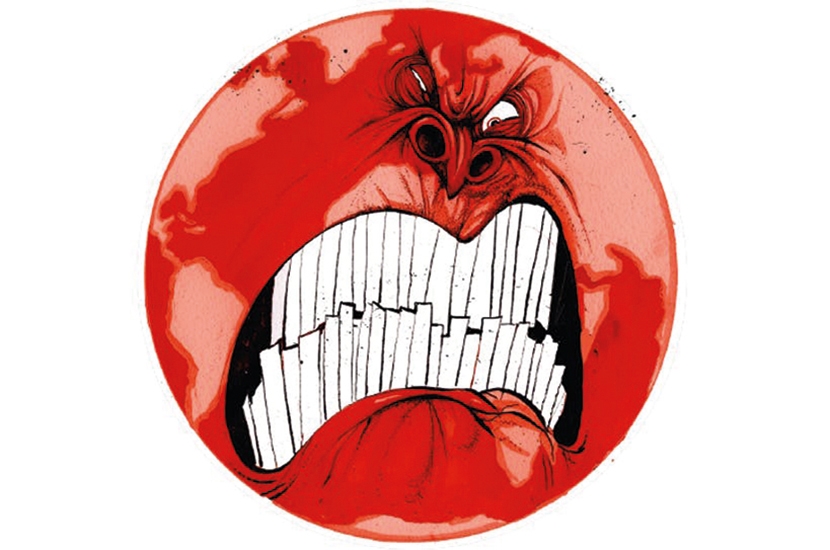Last week, walking into a branch of Waterstones in south London, I made way (or so I thought) for a pixie-faced man in Lycra who was theatrically hauling his bike into the shop. It seemed a bit of a liberty, but these days cyclists are godly folk who can do anything they like, especially in the eco-obsessed puritan commonwealths south of the river.
Then a querulous voice piped up behind me. ‘Excuse me! You just pushed past me and my bike.’
I think it was the ‘and my bike’ that did it. Pixie Face headed for Waterstones’ mandatory display of anti-racist memoirs, bleating about ‘manners’ while caressing his affronted vehicle. And I went off on one, as I always do in these situations.
‘Look, mate, you’ve got mental health issues,’ I said. ‘First you insist on dragging your bike into a bookshop, then you pick a fight with a total stranger, now you’re talking to yourself.’ He muttered something about social distancing. ‘Says the man not wearing a mask,’ I replied in feigned outrage.
By now he was regretting his pushing-past allegation, but there was no stopping me. ‘You need to see a therapist before your problem gets totally out of control,’ I bellowed. And then I stormed out, before my anti-cyclist rage got the better of me and I said something even more unpleasant.
If you’d asked the other shoppers which of us had mental health issues, I doubt they’d have nominated the cyclist. I have a history of fighting with strangers. I don’t start them, and I’m not horrible to everybody: if someone nice asks me directions and I know the answer, then they get hosed down with helpful charm. But as soon as I hear the dreaded ‘Excuse me!’ that precedes an accusation of not looking where I’m going, pushing past or talking too loudly, then hostilities escalate quickly.
I can think of only one episode that didn’t end nastily. I was in the Brompton Oratory, self-importantly explaining the rubrics to my companion, when a red-haired Irish lady hissed at me to shut up. ‘Only if you stop singing out of tune,’ I said. She bristled, thought for a minute, then leaned back and whispered: ‘It wasn’t me singing out of tune. Twas my friend.’ And that’s how I got to meet the late, great Mary Geraldine O’Donnell, who when she wasn’t telling her beads was falling off bar stools. Goodness, how we miss her.
Why am I so drawn to these conflagrations? I suppose I find them cathartic, so long as I get the last word. Recently, though, I’ve caught myself biting my lip rather than opening fire. Where once these things happened once or twice a year, now supermarket aisles have turned into sniper alleys; the readily offended are everywhere, just waiting to blow your head off.
It’s Covid, of course. The other night I was in Sainsbury’s, where masks are now optional. But a portly lady in her seventies, steel-rimmed glasses glinting menacingly, was taking no chances. She kept executing a sort of clumsy pirouette in order to keep the unmasked lepers at least eight feet away. And there are so many like her: pensioners — especially the type who wait to read the bill before fishing out their bloody purse — and, less forgivably, younger people whose hair-trigger tempers remind me of internet trolls. You wonder if, after a year of lockdown, casual social interactions are being poisoned by the indignation and sarcasm encouraged by social media.
At any rate, my spat with Pixie Face has encouraged me to hang up my spurs. Instead I shall mull over past victories, if you can call them that. Such as an altercation I had with a Boots pharmacist in Queensway, c. 1997. (It’s always Boots. Their pharmacists are the ones who like to remind everyone of their professional expertise, even ringing up doctors to query their prescriptions.)
I wanted to buy a cheap generic anti-histamine as a sleep aid. ‘We don’t sell it for that purpose,’ said the pharmacist.
‘But you sell the same chemical at 17 times the price as a branded sleep aid,’ I protested.
‘It’s not the same drug,’ he said, in the authoritative tones of a spokesman for Public Health England. But I knew it was, so I asked him to check. He told me he didn’t welcome customers telling him how to do his job and ordered me out of the store.
I’d lost the fight over the drug, but there was still time for a parting shot. When I reached the door, I called out: ‘It’s not my fault you didn’t get into medical school.’
His jaw dropped open. Bullseye.







Comments